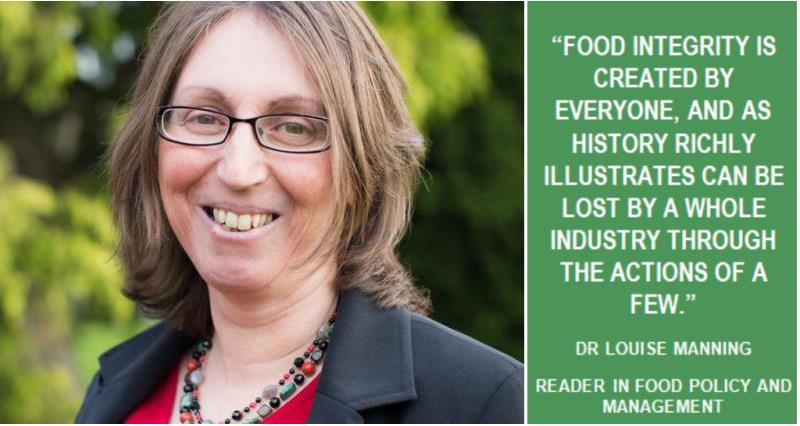Dr Louise Manning, Reader (Associate Professor) in Food Policy & Management, writes about the need for a collective approach in ensuring integrity in the UK’s food supply chain.
Food integrity is a strange notion because in theory, people who produce food at all stages from the farm through manufacturing, logistics, retail, food service, should comply with laws and best practice and it should be a given that food is safe and legal i.e. it is what it says on the tin and is not going to harm anyone. But, and there is a BIG but, we then add in a good dose of human nature. Humans operate food supply chains, humans produce our food for us. We might create a whole set of rules for them to abide by, but individually or collectively they are driven by a whole set of motivations and attitudes, habits, cultural norms that influence their behaviour. Sometimes people (and thus businesses) comply with the rules and regulations and what we think a good business would do, others instead do not do the right thing and can operate outside the law.
Regulation, creating laws and codes of practice implemented by governments, is one measure to deliver food that is consistently safe and is what we say it is. Regulation went up a gear in the UK with the Food Safety Act in 1990. The legal requirements concerning food safety and food standards (labelling) have since become harmonised within the EU and now Brexit adds a further dimension to what UK legislation may be after 2019.
Private standards have also developed in the last thirty years, farm assurance, such as the Red Tractor range of standards, and the British Retail Consortium standards that businesses are required to comply with across food supply chains are just two examples. These standards detail the requirements that a business needs to meet in order to supply a retailer, manufacturer etc. Individual retailers, food service and food manufacturers have developed their own private systems too, but these collective standards now extend beyond food safety and food quality (intrinsic standards) to cover a range of extrinsic standards: environmental standards, animal welfare standards, worker welfare standards and so on and so on. This means that what it is to act with integrity, what retailers, consumers, farmers, manufacturers, believe is integrity, covers so much more today than thirty years ago.
In 1990 there was no internet, very basic computers, specifications for ingredients and finished products were typed on word processors. Now the supply chain is swamped with data and the volume of data and information is ever increasing. New digital systems are being developed and implemented right now to store data and retrieve that data in seconds when required. This creates a whole opportunity for communication through the food supply chain and transparency with consumers, but also new risk around cybercrime in the food supply chain too.
Food supply chains are now truly global. One ready meal could have ingredients from all corners of the world and these need to be authenticated and traced back to their original source. Product ranges become differentiated to add value and develop niche markets and particular consumer segments from foods with a story through to basic and essential ranges. This creates opportunity for criminals and fraudsters to make money by intentionally adulterating or substituting ingredients in products i.e. replacing with cheaper ingredients. There is the potential for counterfeit products in food as equally as any other consumer product. However, recent breakthroughs in laboratory based technology and testing methods to check provenance, breeds and variety using DNA techniques, and tests for authenticity means that proving integrity becomes easier and multiple hand-held products will be on the market in the next few years to check integrity in real-time.
Consumer trust and people and product integrity in food production go hand in hand. Food integrity is created by everyone, and as history richly illustrates can be lost by a whole industry through the actions of a few. We need a collective approach and as food consumers deserve it too.
